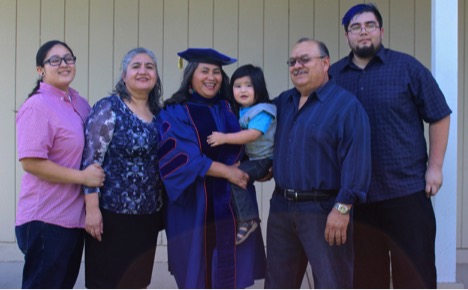Last month on November 8th, 2017, marked the first national celebration of first generation college graduates. It has been designated as a day that institutions of higher education celebrate those that are the first in their families to go on to college and eventually graduate. The event also commemorated the 52nd anniversary of the passing of the Higher Education Act of 1965 that created the federal TRIO programs, such as Upward Bound, Academic Talent Search, and Student Support Services, that would serve first generation and low income students.
I am proud to be the first in my family to have gone off to college. However, that is not all I am. I am the first in my immediate family (mom and dad) to graduate middle school, high school, a four-year university, a private graduate school, and earn a doctoral degree from a top research institution in the United States. Of my entire family, I am the first to earn a college degree, and I am proud to have 2 cousins following my footsteps and will soon earn their college degrees.
As an immigrant to the United States, growing up half my life with a single monolingual speaking parent was extremely difficult. As it is now, data for Latinxs students has shown that about half of a hundred Latinx children that start school in the U.S. will graduate high school, that is about 54 of the 100, and of those less than half a percent will earn a doctoral degree. I know very well that I was statistically not meant to be, that being the first would be a challenge.
I would add that it is very important to note that because you are the first, no one in your family will notice your mistakes because no one else knows better. Things like taking too many classes and getting low grades that impact your GPA go unnoticed, or missing opportunities for scholarships. Your family doesn’t tell you about the importance of meeting with advisors and professors, or that maybe the major I chose was not the best choice for me. This to me has meant that while the trials and errors have been painful at times, you get to celebrate the victories a lot more often.
At one point, I know that being the first felt like a burden, that my family did not understand all the work that I had to do, sometimes doubling or tripling the steps because I did not know that there was an easier way or a short cut to the destination. I am talking about things like taking classes that did not satisfy the general education courses or major requirements, or finding out that I could double major. By meeting with my EOP and major advisors I learned to balance work, community involvement and coursework because they taught me how to do so. I discovered simple things like networking and its impact on access to on-campus jobs, internships, and collaborating with other campuses. But to be honest, as I have grown older and learned the words to describe the obstacles, sacrifices and the blessings, I feel that my life would not be what it is if I had not lived through these experiences.
Finding my way in college led to choosing a major and a career that I never dreamt of, like majoring in Chicano and Latino Studies and Spanish, pursuing a career in higher education and the professoriate. I learned to love my culture – flaws and beauty, as this major taught me so much that I did not learn in high school. I gained a deeper appreciation and love for my mother for her perseverance and her tough love because she had no formal education but kept on pushing me, even if she did not quite know how to help me. I love my family for all their sacrifices and encouragement, and I learned the value and importance of true mentors, those that were honest and constantly reminded me that my dreams could be achieved as long as I asked for help and helped out when it was needed. At the same time, I became more appreciative of my friends whom I found myself constantly holding on to so that I would not fall off the path towards the finish line —a college degree. They too were in this battlefield (college), not just trying to figure it out, but constantly pushing for access for the next generation that were like us – first to navigate and graduate from underserved high schools.
As we celebrate First Gen students, I am proud to be the first to attend and graduate college. I am proud to be the first to earn a doctoral degree even when statistically that should not have been the case. Finally, I am proud to be a mentor to other first generation students, especially to other young Latinas that are not just pursuing a college degree but are now pursuing masters and doctoral degrees.
Mariana Martinez
Latest posts by Mariana Martinez (see all)
- Conozca a Omar Medina, Candidato a Miembro de la Junta Escolar de la Ciudad de Santa Rosa para el Área 4 - October 2, 2018
- Meet Omar Medina, Candidate for Santa Rosa City School Board Trustee for Area 4 - September 26, 2018
- Perfil de Luchadora: Conozca a Ariana Aparicio, Estudiante DACA y Dirigida a Harvard - August 28, 2018
- Luchadora Profile: Meet Ariana Aparacio, DACAmented and Headed to Harvard - August 24, 2018
- La Estudiante de Sonoma State Patricia Ayala Macías, Comparte Por Qué es Importante Que Los Estudiantes Universitarios Participen en el Gobierno Estudiantil - April 6, 2018

